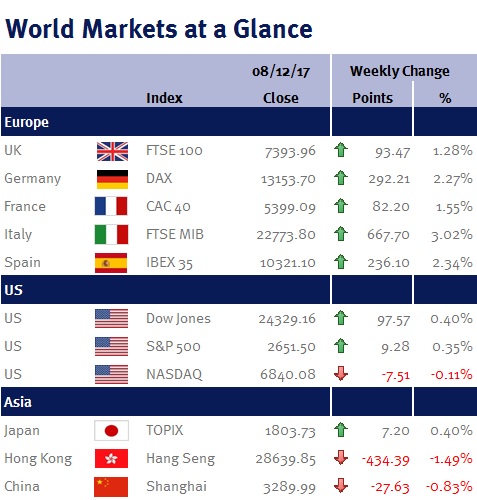Week ending 8th December 2017.
11th December 2017
US jobs data was more of the same: job growth was robust but wage gains tepid. Non-Farm Payrolls rose 228,000 (beating forecasts of 195,000) and while average hourly earnings increased 2.5% from a year earlier; it was less than the 2.7% economists had projected. Additionally, October’s figure was revised down from 2.4% to 2.3%.

Also, helping US sentiment this week was news that the US government avoided a shutdown after Congress passed legislation to maintain funding for two weeks to allow lawmakers until Friday 22 December 2017 to overcome differences.
The pound whipsawed on Brexit news this week. After starting the week at $1.351, as Brexit talks stumbled over the Irish border so did the pound, touching a low of $1.332 yesterday (Thursday 7 December 2017). However, today’s (Friday 8 December 2017) “breakthrough” initially sent the pound higher (touching $1.3521), only to drop back to $1.3397 after the EU said it was not realistic to expect a trade deal by March 2019.
Incidentally, I am very confused by all the talk that Canada’s deal with the EU is seen as the preferred model for the UK, as Canada has no access to the banking passport system that the UK needs to allow banks and financial services to trade freely.
Additionally in the UK, while at first glance the British Retail Consortium’s 0.6% sales gain in November looks very encouraging and partly reverses October’s 1% decline, the breakdown clearly illustrates the current squeeze on household purchasing power, as the rise was due to higher food spending (i.e. essential spending), which rose 2.8%, while non-food sales (i.e. non-essential/discretionary spending) actually fell 1.2%. And as the consumer accounts for around 60% of the UK economy this will clearly act as a drag on the economy – and only increases my conviction that the BoE is unlikely to increase interest rates again anytime soon.
Monetary policy meetings will dominate markets this coming week as policymakers from the BoE, Fed and ECB meet to set interest rates (although only the Fed is expected to change policy – please see my comments above). We also have plenty of other data from the UK and US, with both releasing PPI, CPI and retail sales data. Additionally in the UK, we have unemployment data.
Ian Copelin, Investment Management Expert*
*Ian Copelin is an Investment Director at Wealth at Work Limited which is a member of the Wealth at Work group of companies
The latest market updates are brought to you by Investment Managers & Analysts at Wealth at Work Limited which is a member of the Wealth at Work group of companies.
Links to websites external to those of Wealth at Work Limited (also referred to here as 'we', 'us', 'our' 'ours') will usually contain some content that is not written by us and over which we have no authority and which we do not endorse. Any hyperlinks or references to third party websites are provided for your convenience only. Therefore please be aware that we do not accept responsibility for the content of any third party site(s) except content that is specifically attributed to us or our employees and where we are the authors of such content. Further, we accept no responsibility for any malicious codes (or their consequences) of external sites. Nor do we endorse any organisation or publication to which we link and make no representations about them.

